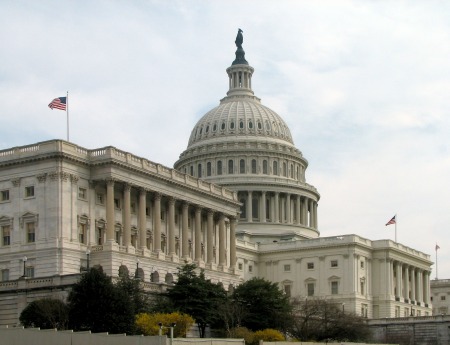Senate Judiciary to Big Tech: Change is Coming
Sec. 230 reform at minimum, antitrust-driven breakups on table

The smarter way to stay on top of the multichannel video marketplace. Sign up below.
You are now subscribed
Your newsletter sign-up was successful
The Republican-controlled Senate Judiciary Committee took its turn taking Big Tech to the woodshed in a hearing Tuesday (Nov. 17) entitled "Breaking the News: Censorship, Suppression, and the 2020 Election" that included threats of breaking up companies and/or heavily regulating them.
Republicans have been focused on what they see as Silicon Valley's censorship of conservative speech, including the President's. Democrats are also concerned about Big Tech, but see edge providers as too lenient on what they see as hate speech and disinformation, some arguing the companies have been cowed by Republican attacks to back off flagging content.
Related: Rep. Cicciline Calls on Twitter to Suspend Trump Account
On hand, virtually, were Twitter CEO Jack Dorsey and Facebook CEO Mark Zuckerberg, who said they were doing their best to moderate content while balancing free speech and privacy.
Committee chairman Lindsey Graham (R-S.C.), one of the President's biggest supporters, and ranking member Richard Blumenthal (D-Conn.) set the tone of the hearing from the outset.
Graham said he was concerned that social media had addictive properties, like tobacco, that posed a health risk, in this case a mental health risk, particularly to young people constantly connected to the Web and from companies that try to maximize that engagement.
Related: Social Net CEO's Get Senate Grilling
The smarter way to stay on top of the multichannel video marketplace. Sign up below.
He cited studies showing links between social media and heightened depression and anxiety--Zuckerberg said those studies were not conclusive--and said social media was designed to sustain attention and engagement, an addictive mix akin to a slot machine, and gamified social interactions to keep them going.
Asked if he agreed his platform was addictive, Zuckerberg said it was definitely not designed to be so.
Blumenthal was even harsher on his witnesses.
Sen. Blumenthal said that Facebook and Twitter are terrifying tools of persuasion and manipulation, with power exceeding that of the old robber barons as they strip mine data and promote hate speech and voter suppression. He said the platforms had taken baby steps to address the problems, but that their destructive, incendiary misinformation was still a scourge, one that needed addressing via antitrust enforcement.
He told them their platforms had weaponized child predators and violent white supremacists, setting back civil rights protections, consumer protections, and competition.
Both agreed that there needed to be substantive changes to the Sec. 230 immunity social media platforms enjoy from civil liability over how they moderate third party content, content that looks a lot like editorial decision-making to some Republicans still unhappy with Twitter's flagging of the President's tweets and the blocking of a story in the New York Post about Hunter Biden.
Related: Justice Unveils Legislation to Regulate Social Media
In fact, Dorsey suggested that how it handled the Hunter Biden story was essentially the reason for the hearing, and that it was only because the story featured hacked materials and it has a policy of taking down posts based on hacked materials.
Graham said he would prefer that companies come up with their own best practices, including transparency on how they decide what to take up and leave down and who is deciding it. He also said that Twitter and Facebook had in the most part been a boon to society and communications.
Blumenthal was more focused on strong government action up to and including breaking up Big Tech companies and potentially eliminating most of Sec. 230's liability protections.
Related: Trump Tackles the Edge
He said he didn't want the government deciding what content to take up or down, but when you have companies that have more power than governments or traditional media outlets, he said, "something has to give. Sec. 230 needs to be changed.
Blumenthal said he agreed that change must come. Even both Dorsey and Zuckerberg said they also agreed some change to Sec. 230 was necessary, with Zuckerberg more amenable to the government helping determine the best way forward of content moderation.
But while Graham and Republicans were concerned about partisan flagging and blocking content, Blumenthal said they needed to do more of that, and that when it came to what he saw as voter suppression and disinformation (like voter fraud theories), was their civic responsibility.
Related: Group Seeks Federal Protection for Journalists
Blumenthal said he feared the hearing was meant to bully the platforms from taking more responsible action by threatening Sec. 230 reform. He said the hearing title was a misnomer, and that what the majority called censorship was avoiding amplifying disinformation, some of it dangerous.
But Blumenthal agreed that change was coming, including to Sec. 230 and antitrust enforcement.
Sen. Blumenthal said he hoped there would be further hearings on privacy and antitrust and Sec. 230 with Big Tech. Graham agreed that would be a good idea, though if the Republicans retain the gavel, that will be up to the new Judiciary chairman, Chuck Grassley (R-Iowa)
Contributing editor John Eggerton has been an editor and/or writer on media regulation, legislation and policy for over four decades, including covering the FCC, FTC, Congress, the major media trade associations, and the federal courts. In addition to Multichannel News and Broadcasting + Cable, his work has appeared in Radio World, TV Technology, TV Fax, This Week in Consumer Electronics, Variety and the Encyclopedia Britannica.

